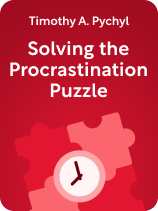

This article is an excerpt from the Shortform book guide to "Solving the Procrastination Puzzle" by Timothy A. Pychyl. Shortform has the world's best summaries and analyses of books you should be reading.
Like this article? Sign up for a free trial here.
Do you put off work that needs to get done? What’s the book Solving the Procrastination Puzzle about?
In Solving the Procrastination Puzzle, psychologist Timothy A. Pychyl contends that you aren’t procrastinating because you’re bad at managing your time. Instead, you’re procrastinating because you haven’t learned how to handle your emotions.
Read below for a brief Solving the Procrastination Puzzle book overview.
Overview of Solving the Procrastination Puzzle
All of us know (some of us quite intimately) what procrastination is. This counterproductive but irresistible tendency tempts us into putting off a task to get some benefits now in exchange for some costs later. In his book Solving the Procrastination Puzzle (2013), psychologist and professor Timothy A. Pychyl explains that by telling yourself “I don’t feel like it” and putting a task off until later, you prioritize how you feel in the short term over the goals you want to achieve in the long term. In doing so, you’re knowingly sabotaging your own progress, and you might not even realize why you’re doing it. Pychyl contends that procrastination is less of a problem with managing our time and more of a problem with managing our emotions. Without learning to handle the emotions that cause you to put off your tasks, you’re stuck.
Pychyl spent his career researching procrastination and how it affects our well-being. He retired from his position as an associate professor at Carleton University in Ottawa in 2022, and in 2023 he created a procrastination-focused series for the popular Waking Up meditation app. Pychyl sees procrastination as a puzzle you have to solve: You have to understand each of its pieces and how they fit together. Pychyl contends that if you can identify what emotions are causing you to put off the tasks you chronically delay, then you can start to see your procrastination habit—and a realistic path to curtailing it—more clearly.
What Is Procrastination?
Throughout the book, Pychyl corrects some common misconceptions about procrastination—like the idea that we procrastinate because we’re bad at managing our time or the belief that to kick the procrastination habit, we have to put a stop to any kind of delay that slows our progress toward our goals. In this section, we’ll take a look at how Pychyl explains what procrastination is and how he explains what procrastination isn’t (making a useful distinction between procrastination and other, more productive kinds of delays).
Procrastination Isn’t About Time, But Emotions
Procrastination is a choice to postpone a task you need to complete, even though you know that negative consequences will follow. Pychyl explains that when you choose to procrastinate, you deliberately make a decision that sabotages your progress toward your goals. But your knowledge that there will be consequences doesn’t make the habit any easier to overcome. That’s because procrastination isn’t rational: Instead, it’s driven by emotions.
You’ve likely heard that procrastination results from a failure of the cognitive capacity psychologists call self-regulation: the ability to manage your emotions, attention, and behavior so you can work toward your goals or act according to your values. Pychyl contends that procrastination is specifically a failure of emotion regulation. He explains that you procrastinate because you want to feel positive emotions, and you achieve that by avoiding tasks that make you feel negative emotions about your work or yourself.
We associate all kinds of negative emotions with the tasks we procrastinate on. For example, you might put off reading a proposal at work because you anticipate being bored by it. Or you might delay assembling the desk your partner asked you to build because you’re worried you’ll struggle with the instructions—being defeated by an Ikea desk would be pretty humiliating.
By avoiding negative emotions, we get to feel better temporarily. However, as Pychyl points out, we typically feel bad about procrastinating, so we don’t get to opt out of negative emotions altogether. Nonetheless, we choose to “feel good” for the moment by both avoiding an unpleasant task and imagining ourselves accomplishing that task some other time—like “later” or “tomorrow.” The problem is that this doesn’t happen just once: Procrastination becomes a habit, one prompted by the thoughts or feelings we associate with a task.
Not Every Delay Is Caused by Procrastination
Before we dig further into what causes procrastination and how you can overcome it, Pychyl contends that it’s important to learn to tell the difference between procrastination and more productive kinds of delays that can temporarily impede your progress toward your goals. He points out that it’s sometimes necessary to put a task on the back burner, for all kinds of practical (and rational) reasons. To work toward your most important goals or fulfill the obligations of your most significant roles, you often have to put one task ahead of the other things on your agenda, handling the most important or most time-sensitive things first.
Prioritizing inevitably leads to putting off some tasks, but Pychyl emphasizes that’s not the same thing as procrastination. For example, you might have to push back a project at work to stay home with your child when they catch the flu. You’re delaying something you need to do, but you’re doing it to take care of something more important. Pychyl says these delays don’t qualify as procrastination. Procrastination only happens when we deliberately put off a task that we could (and should) begin right away. You can recognize procrastination because you’re not putting the task off for a rational reason: Instead, you don’t feel like getting started on it, so you defer it until “later” or “tomorrow.”
Why Is Procrastination Harmful?
If you’re reading this guide, you probably realize that procrastination comes with some costs. Pychyl contends it’s important to be aware of the specific ways your procrastination habit works against you. After all, procrastination keeps you from putting your limited time to the best possible use, and this can have a cascade of consequences. In this section, we’ll consider three ways that procrastination can sabotage you: by hurting your ability to do your best work, increasing the negative feelings you experience, and undermining your health and well-being.
It Chips Away at Your Ability to Get Things Done
Making a habit of putting things off hinders your ability to do and be your best. Pychyl warns that when you give in to procrastination and delay working on the tasks that your partner, your boss, or your friends are depending on you to complete, you don’t put your best effort into fulfilling your obligations. He warns that it’s easy to disappoint yourself or somebody else and regret it later.
Pychyl argues that if you aren’t able to find the time to do the things you said you would, procrastination can undermine your relationships with the people you care about most. It can also make you regret missing out on things you always wanted to do but never got around to doing, like taking the trip you and your partner have always talked about.
When you keep putting a task off, you might find yourself in the final stretch before the deadline with little time left to do a good job. Pychyl explains that procrastination often reduces the quality of the work you ultimately do. This can feel like an acceptable trade-off because it seems to lower the stakes, too. (If you do a good job, you manage to perform well even when working at the last minute. And if you do a poor job, you can just attribute it to the lack of time left to complete the task, and move on.) But no matter how you justify it to yourself, procrastination still keeps you from doing your best work.
It Results in More Negative Feelings, Not Fewer
You might recall from the previous section that the desire to avoid negative emotions often drives procrastination. Pychyl warns that this rarely works out the way we expect it to: Procrastination doesn’t really make you feel happier, even in the moment. He explains that when you know you should be working on a task you’ve delayed, you probably feel mixed emotions about it. One of the most common is guilt (which you feel when you know you’re doing something that conflicts with your sense of what’s right or wrong for you).
Additionally, procrastination causes you to feel an array of negative emotions later, when you have to deal with the consequences. Pychyl contends that deferring a task often results in more negative emotions than you’d experience if you’d just gotten started on the task, no matter how unpleasant it is. For example, as many undergraduates learn, if you wait to write a paper until the night before it’s due, you’ll spend the night feeling anxious, harried, or frantic—and the next day feeling sleep-deprived and regretful.
It Takes a Toll on Your Physical Health
Research also shows that procrastination can have a harmful effect on your health and well-being. How is that possible? Pychyl explains that first of all, procrastination causes stress. (Just think of how stressful it is to write a paper the night before it’s due!) But stress isn’t just a feeling: Stress is a psychological, emotional, and physical reaction to the challenges you experience. Even when you create a stressful situation yourself by putting off until later something you should do now, that stress can have an impact on your body, and sometimes that impact can harm your health.
According to Pychyl, another reason that procrastination takes a toll on your physical health is that while putting off a few unpleasant tasks can seem harmless, procrastination isn’t so innocuous when it involves health-related tasks. Skipping gym sessions, delaying the start date for healthier eating habits, pushing back your bedtime, failing to find the time for doctor’s appointments, and delaying recommended health screenings all keep you from taking care of yourself to the best of your ability. Your health can suffer in the long run: After all, your blood pressure doesn’t care that you always intend to exercise more or that you have a plan to start a new diet next month.
Why Do We Procrastinate, and How Can We Stop?
Procrastination is frustrating because we know what it is and we can see how it hurts us, but we keep doing it anyway. In this section, we’ll explore three forces behind procrastination: our desire for rewarding experiences, our trouble making realistic plans, and our lack of preparedness for obstacles and challenges.
We Seek Out Rewards, and We Prefer Rewards Now Over Later
The first reason we procrastinate is that we want to have experiences that our brains perceive as rewarding—experiences that feel good rather than bad. According to Pychyl, this tendency explains two psychological causes of procrastination: your preference for getting a reward now even if there will be costs later, and your preference for a reward now over a better reward later.
We Choose a Reward Now, Even if There Are Consequences Later
One way that your brain’s love of rewards causes procrastination ties into the insight, which Pychyl emphasizes throughout the book, that you often procrastinate so you can avoid confronting the uncomfortable emotions or thoughts that a task brings up. When you feel you’ve sidestepped negative feelings, at least temporarily, that can feel rewarding. Procrastination becomes a habit when you do this over and over again, establishing a pattern of avoiding tasks so you can feel rewarded now and deal with the costs of those decisions later.
We Care Less About Future Rewards Than Present Ones
A second way that the reward circuitry in your brain trips you up, says Pychyl, is by incentivizing you to pick a reward now over an even better reward later. While it would feel rewarding to finish a project or achieve a goal later, your brain wants you to instead choose a much smaller, more immediate reward, like a half-hour spent scrolling through TikTok videos you’ll immediately forget.
Choosing a small reward now instead of a big reward later doesn’t quite make sense, so your brain also knows exactly how to convince you that your decision is sound. Pychyl points out that when you procrastinate, you know the decision to put off an important task doesn’t align with your values or goals. This means you experience cognitive dissonance: the uncomfortable tension that arises from holding two conflicting ideas in your mind at the same time. (For example, those conflicting ideas might be “I want to exercise more” and “I’m not going to run today.”) One way you resolve the tension and explain away the dissonance is by making excuses about why now isn’t the right time for the task—but tomorrow will be different.
We’re Bad at Planning
The second reason we procrastinate is that we have trouble with planning. Figuring out how to accomplish everything on your to-do list requires planning when and how you’ll get things done. But most of us aren’t very good at these kinds of plans. Pychyl explains that this puts you on a direct path to procrastination by making you think you really will feel like doing a dreaded task tomorrow and tripping you up when you estimate how long a task will take.
We Genuinely Think We’ll Do It “Later” or “Tomorrow”
Pychyl writes that you probably tell yourself that you don’t feel like doing a task now, but you’ll feel like it “later” or “tomorrow.” Almost every time, you’re definitely wrong, yet you genuinely feel like you’re right. That’s because, in addition to having trouble planning, your brain also has trouble predicting how you’ll feel in the future.
Because of a cognitive bias called focalism, you don’t think about all of the factors that will affect your mood in the future. You might really think you’ll feel like cleaning the house tomorrow night. But you’re likely not considering how a long day of work will leave you tired and an evening helping your kids with homework will make you grumpy about having to relearn fractions. Plus, because of a bias called presentism, you assume that how you feel now is how you’ll feel later. But this often isn’t accurate. You likely feel a lot more enthusiastic about leaving the cleaning until tomorrow in the present (as you’re making that decision) than you will in the future, when “tomorrow” is here and it’s time to get to work.
We Underestimate the Time a Task Will Take
Another problem that contributes to trouble with planning, and then to procrastination, is the inability to accurately predict how much time you’ll need to complete a task. Pychyl explains that because of a cognitive bias called the planning fallacy, you probably underestimate the amount of time each task will take. You might think it’s reasonable to leave a task until Sunday, since it’ll only take you two or three hours to get it done. But come Sunday, it might take you six or seven hours instead, far longer than you expected.
We Aren’t Prepared to Deal With Obstacles Along the Way
A third reason we find ourselves procrastinating is that we don’t prepare for even the most obvious things that might go wrong, according to Pychyl. You know yourself and know how you typically behave, but you likely don’t use that information to your advantage. That leads to two causes of procrastination: neglecting to prepare for distractions and failing to see how your personality may prime you to delay your tasks.
We Aren’t Prepared to Deal With Distractions
Pychyl explains that one of the most common obstacles that can throw you off when you work toward a goal is also one of the simplest: distractions. Whether they come in the form of colleagues knocking on your door or push notifications from your favorite social media app, distractions pull your attention away from what you need to do and make it harder for you to make meaningful progress. But as Pychyl notes, you probably don’t prepare yourself to run this gauntlet of interruptions.
We Don’t Recognize Personality Traits That Make Us Likely to Procrastinate
Another obstacle that might stand between you and your goals—and divert you toward procrastination if you don’t prepare for it—is more difficult to change: your personality. Pychyl explains that certain personality traits have been linked to procrastination. Three traits, in particular, seem to have a marked link to higher rates of procrastination: Neuroticism (the tendency to experience negative emotions more than other people), impulsivity (the inclination to make choices without thinking them through fully), and perfectionism (specifically the kind of perfectionism caused by your perception that other people have unrealistically high expectations of your performance).

———End of Preview———
Like what you just read? Read the rest of the world's best book summary and analysis of Timothy A. Pychyl's "Solving the Procrastination Puzzle" at Shortform.
Here's what you'll find in our full Solving the Procrastination Puzzle summary:
- The real reason why you procrastinate
- How procrastination undermines your ability to live a happy, healthy life
- Practical advice for changing your relationship with your most dreaded tasks






